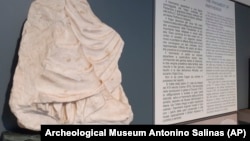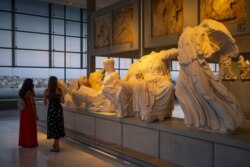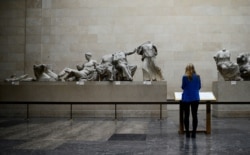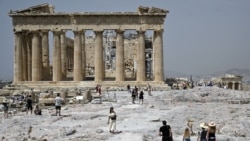Greece this week takes delivery of an ancient fragment that once adorned the Parthenon temple, the country’s most important archeological site. The return from a museum in Italy is being seen as the strongest nudge yet to the British Museum, which holds the largest collection of Parthenon Sculptures and has refused for centuries to return the antiquities to their ancient home.
The marble fragment will be unveiled at the Acropolis Museum Monday, displayed in a full-size representation of the Parthenon’s frieze.
The return is part of a groundbreaking loan deal signed between the Acropolis Museum and the Antonio Salinas Regional Archeological Museum in Sicily, where the artifact has been on display since the 19th century.
The Parthenon fragment, depicting the foot of a goddess, will be lent for a four-year period in exchange for a fifth century B.C. headless statue of the goddess Athena and an eighth century B.C. amphora as part of an extensive cultural exchange agreement. The loan period may be extended a further four years, and the fragment’s move to Greece could eventually become permanent.
Sicily’s councilor for culture, Alberto Samonà, said this is an important cultural exchange that can pave the way for even bigger international exhibits organized by the Salinas museum and the Acropolis museum.
Experts in Greece say the loan deal adds to mounting pressure on Britain to follow suit with the so-called Elgin Marbles, a massive collection of sculptures assembled by Thomas Bruce, the seventh earl of Elgin, who in the early 1800s was the British ambassador to the Ottoman empire, which then controlled Greece. Britain bought them from Elgin in 1816 after a parliamentary inquiry into the legitimacy of his ownership.
The dispute marks one of the longest-standing cultural rows in history, with Athens demanding for decades that the British Museum return the marble masterpieces to Greece. Greeks have accused the late British aristocrat of cultural theft.
Last week, Greek Prime Minister Kyriakos Mistotakis made a new bid for the return of the sculptures as the Acropolis Museum installed 10 fragments of the Parthenon frieze stored in the capital’s archeological Museum.
The return of the Parthenon Sculptures from the British museum, he said, is a political and ethical issue with international implications. The prime minister said the return is all about healing a wound created violently and illegally by Elgin.
Mitsotakis raised the issue in talks with his British counterpart, Boris Johnson, late last year, offering to lend some Greek historical treasures to the British Museum.
The prime minister’s office has since said the offer is a matter for the British Museum to decide. It added, however, that the marbles were bound to remain in Britain, arguing they were legally acquired and not the subject of an ownership dispute.







